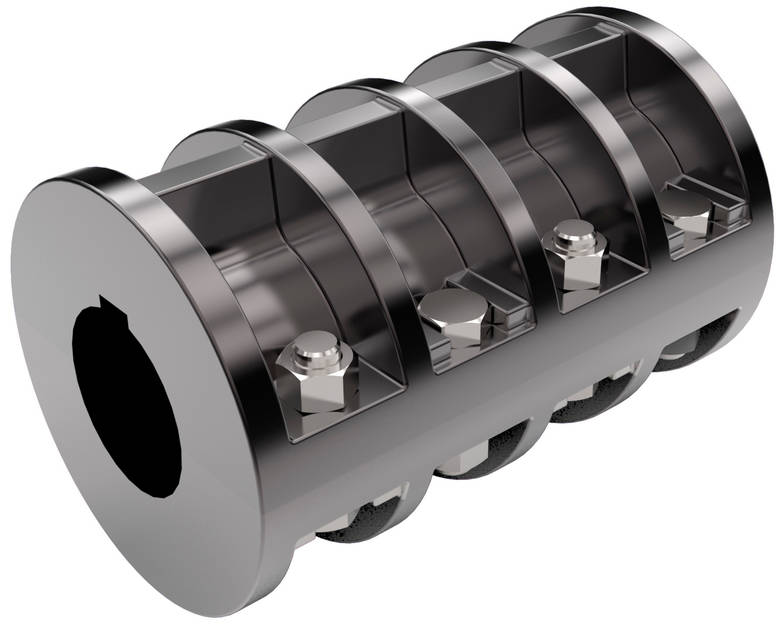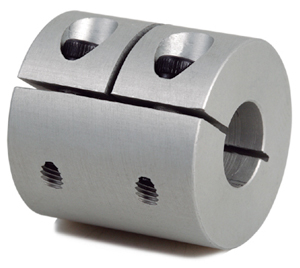Product Description
Steel Material Rigid Shaft Flexible Spring Shaft Snake Grid Coupling
Description:
It is a kind of metal elastic variable stiffness coupling with advanced structure ,which transmits torque by serpentine spring plate embedded in the tooth groove of 2 half couplings ,mainly composed of 2 half couplings,two half covers,two sealing rings and serpentine spring plate.
Feature
1.The serpentine spring as the elastic element, the elastic strong at the same time, greatly improves the grid coupling torque, widely used in heavy machinery and general machinery.The serpentine spring special technology department, has long service life, allowing higher speed, has good ability to compensate in the axial, radial and angle
2.High transmission efficiency, start safety. Transmission efficiency of up to 99.47%, short-time overload capacity is 2 times the rated torque, operation safety.
3.Simple structure, convenient assembly and disassembly, long service life.
4.Damping effect is good to avoid the resonance.
Details
Basic Parameter
| Model | Nominal | Speed | Y,Z Bore | L | L2 | D | C | KG | |||
| Torque | r/min | d1,d2 | J | Grease | |||||||
| Nm | Max | Min | KG.M2 | Kg | |||||||
| JS1 | 45 | 4500 | 28 | 18 | 47 | 66 | 95 | 3 | 1.91 | 0.00141 | 0.5712 |
| JS2 | 140 | 35 | 22 | 47 | 68 | 105 | 2.59 | 0.057123 | 0.0408 | ||
| JS3 | 224 | 42 | 25 | 50 | 70 | 115 | 3.36 | 0.00327 | 0.0544 | ||
| JS4 | 400 | 50 | 32 | 60 | 80 | 130 | 5.45 | 0.00727 | 0.068 | ||
| JS5 | 630 | 4350 | 56 | 40 | 63 | 92 | 150 | 7.26 | 0.00119 | 0.0862 | |
| JS6 | 900 | 4125 | 65 | 40 | 76 | 95 | 160 | 10.44 | 0.0185 | 0.113 | |
| JS7 | 1800 | 3600 | 80 | 55 | 89 | 116 | 190 | 17.7 | 0.571 | 0.172 | |
| JS8 | 3150 | 95 | 65 | 98 | 122 | 210 | 25.42 | 0.0787 | 0.254 | ||
| JS9 | 5600 | 2440 | 110 | 75 | 120 | 155 | 250 | 5 | 42.22 | 0.178 | 0.426 |
| JS10 | 8000 | 2250 | 120 | 85 | 127 | 162 | 270 | 54.45 | 0.27 | 0.505 | |
| JS11 | 12500 | 2571 | 140 | 90 | 149 | 192 | 310 | 6 | 81.27 | 0.514 | 0.735 |
| JS12 | 18000 | 1800 | 170 | 110 | 162 | 195 | 346 | 121 | 0.989 | 0.908 | |
| JS13 | 25000 | 1650 | 200 | 120 | 184 | 201 | 384 | 178 | 1.85 | 1.135 | |
| JS14 | 35500 | 1500 | 200 | 140 | 183 | 271 | 450 | 234.26 | 3.49 | 1.952 | |
| JS15 | 50000 | 1350 | 240 | 160 | 198 | 279 | 500 | 316.89 | 5.82 | 2.815 | |
| JS16 | 63000 | 1225 | 280 | 180 | 216 | 304 | 566 | 6 | 448.1 | 10.4 | 3.496 |
| JS17 | 90000 | 1100 | 300 | 200 | 239 | 322 | 630 | 619.71 | 18.3 | 3.76 | |
| JS18 | 125000 | 1050 | 320 | 240 | 260 | 356 | 675 | 776.34 | 26.1 | 4.4 | |
| JS19 | 160000 | 900 | 360 | 280 | 280 | 355 | 756 | 1058.27 | 43.5 | 5.63 | |
| JS20 | 224000 | 820 | 380 | 300 | 305 | 432 | 845 | 13 | 1425.56 | 75.5 | 10.53 |
| JS21 | 315000 | 730 | 420 | 320 | 325 | 490 | 920 | 1786.49 | 113 | 16.07 | |
| JS22 | 400000 | 680 | 450 | 340 | 345 | 546 | 1000 | 2268.64 | 175 | 24.06 | |
| JS23 | 500000 | 630 | 480 | 360 | 368 | 648 | 1087 | 2950.82 | 339 | 33.82 | |
| JS24 | 630000 | 580 | 460 | 400 | 401 | 698 | 1180 | 3936.3 | 524 | 50.17 | |
| JS25 | 800000 | 540 | 500 | 420 | 432 | 762 | 1260 | 4686.19 | 711 | 67.24 | |
Production workshop
/* March 10, 2571 17:59:20 */!function(){function s(e,r){var a,o={};try{e&&e.split(“,”).forEach(function(e,t){e&&(a=e.match(/(.*?):(.*)$/))&&1

Can rigid shaft couplings operate in high-temperature or corrosive environments?
Rigid shaft couplings can be designed and manufactured using materials that are suitable for high-temperature or corrosive environments. Common materials used for such applications include stainless steel, nickel alloys, and other corrosion-resistant materials. These materials can withstand elevated temperatures and resist the effects of corrosive substances. When selecting a rigid shaft coupling for high-temperature or corrosive environments, it is essential to consider factors such as the operating temperature range, the specific corrosive substances present, and the overall environmental conditions. Additionally, proper lubrication and maintenance are crucial to ensuring the longevity and optimal performance of rigid couplings in these demanding environments. It is essential to consult with coupling manufacturers or suppliers who specialize in providing solutions for high-temperature or corrosive applications. They can help identify the appropriate materials and designs that will meet the specific requirements of the intended environment.

Can rigid shaft couplings reduce vibrations and noise in mechanical systems?
Rigid shaft couplings are primarily designed for accurate torque transmission and shaft alignment. While they are not specifically intended to reduce vibrations and noise, they can indirectly contribute to minimizing vibrations and noise in mechanical systems.
Here’s how rigid shaft couplings can help mitigate vibrations and noise:
- Shaft Alignment: Rigid couplings ensure precise alignment between connected shafts. Proper alignment reduces angular and axial misalignment, which can lead to vibrations and noise. By maintaining alignment, rigid couplings prevent the generation of excessive forces that contribute to vibration.
- Reduced Dynamic Imbalance: Accurate alignment achieved by rigid couplings helps in minimizing dynamic imbalance, which is a common cause of vibrations. When shafts are misaligned, it can lead to uneven distribution of forces and create vibrations in rotating machinery.
- Minimized Wear: Rigid couplings prevent misalignment-induced wear and excessive friction between shafts. This helps in reducing the potential for vibration-producing irregularities that can arise from worn or damaged components.
- Stable Connection: Rigid couplings create a solid and stable connection between shafts. This stability minimizes the likelihood of resonances and vibrations caused by flexible components that might amplify vibrations in the system.
- Uniform Torque Transmission: Rigid couplings facilitate even torque distribution between shafts. Uneven torque transmission can lead to fluctuations and vibration-causing oscillations in the system.
While rigid couplings can provide some indirect benefits in reducing vibrations and noise, they might not be as effective as specialized vibration-damping couplings or other mechanical solutions explicitly designed for vibration and noise reduction. In cases where vibration and noise reduction are critical, engineers might consider incorporating additional measures such as damping materials, flexible couplings, or vibration isolators.
Ultimately, the choice of coupling and vibration reduction strategy depends on the specific requirements of the application. If vibration and noise reduction are primary concerns, it’s advisable to consult with engineering experts and consider coupling designs that prioritize these attributes.

Are There Different Types of Rigid Shaft Couplings Available, and What Are Their Specific Applications?
Yes, there are different types of rigid shaft couplings available, each with its own specific applications. Some common types of rigid shaft couplings include:
- Sleeve Couplings: Sleeve couplings are simple and cost-effective couplings that connect two shafts together using a solid sleeve or tube. They are commonly used in applications with moderate torque requirements and where shaft alignment can be maintained with high precision.
- Clamp or Split Couplings: Clamp or split couplings consist of two halves that are clamped together around the shafts using screws or bolts. They are easy to install and suitable for applications where frequent maintenance or disassembly is required.
- Flanged Couplings: Flanged couplings have flanges on both ends that are bolted together. They are used in applications where shafts need to be rigidly connected and where some degree of axial movement is expected.
- Tapered Shaft Couplings: Tapered shaft couplings have tapered bores that fit tightly onto tapered shafts, creating a friction-based connection. They are often used in applications where precise alignment and torque transmission are essential.
- Keyed Shaft Couplings: Keyed shaft couplings use a key and keyway arrangement to connect the shafts securely. They are commonly used in heavy-duty applications where high torque transmission is required.
The choice of rigid shaft coupling depends on the specific requirements of the application. Factors such as torque transmission, shaft size, alignment precision, ease of installation, and maintenance needs play a crucial role in selecting the appropriate coupling type.
Rigid shaft couplings are widely used in various industries, including manufacturing, power generation, robotics, aerospace, and automotive. They are often employed in applications such as pumps, compressors, conveyors, and high-precision machinery.
It is essential to consider the specific demands of the application and consult with coupling manufacturers or experts to determine the most suitable rigid coupling type for optimal performance and reliability.


editor by CX 2024-02-22